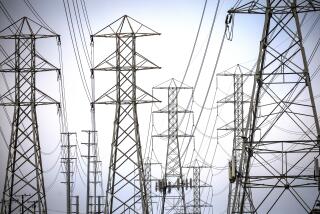Home Improvement : Think Conservation Even When You Rent
- Share via
QUESTION: You give a lot of good advice to homeowners and I always read your column. But I rent, so most of your advice doesn’t help me. How about some tips for renters? Our utility bills are just as high as homeowners’.
ANSWER: The best time to think about money-saving energy conservation is before you rent. A little additional time spent evaluating rental units for energy-saving features can save money and increase comfort once you move in.
If you are already renting a unit, you should still do an evaluation of your rental for energy efficiency.
You may not have the leverage you had when you signed the rental agreement, but if you have been a good tenant, the manager will want to keep you in the unit. Having a good renter is a valuable asset.
Here are some tips:
Start with age. As a general rule, rental units built since about 1975 tend to be more energy efficient than most older units. If choosing a unit in a complex, look for one in the middle. The walls, ceilings and floors of the surrounding units act as buffers. Top or bottom corner units suffer the most heat loss, since they are exposed.
Inspect doors and windows. They should fit tightly and be weatherstripped. Open all windows and doors to test their fit.
If there is a fireplace, check the damper. Does it seal properly? Does the fireplace have glass doors? Without glass doors, a fireplace can be an energy gobbler.
Do the bathroom and kitchen fans have dampers? If not, it’s like leaving a window open all winter.
Check for insulated glass. In cool weather, either one will significantly reduce your monthly heating costs and increase comfort. Look for signs of water damage or mildew on window sills, in the bathroom and in the kitchen.
These are good indicators of moisture problems, which can be reduced with use of bath and kitchen fans, and weatherproofing.
Ask the manager how the unit is insulated and how much the average winter heating costs are. If they can’t answer the question, be skeptical about the rental.
Find out what utilities you are paying for. Heat? Electricity? Water? Sewer?
The more poorly weatherproofed the rental, the less willing you should be to rent--especially if utilities are your responsibility.
Check out the heating system. Are separate rooms in the unit on their own thermostat? If they are, you can save money by turning down the heat in unoccupied rooms. Ask when the heating system was last tuned up. Check the air filters if it is a forced-air system. Furnaces should be tuned every year.
Don’t forget the water heater. It’s the second biggest energy user, after the heating system. It should be wrapped with insulation and the temperature set to 120F.
Water leaks are also expensive. Make sure they’re repaired before you move in. Check the appliances. Do they have any energy-saving features?
Before you sign a rental agreement, ask the manager about correcting any energy problems you may have spotted. Will they caulk and weatherstrip?
If the manager doesn’t want to install conservation measures, consider negotiating. Would they be willing to purchase weatherproofing materials for you to install?
Occupant Behavior Affects Energy Use
A major element in the amount of energy consumed by any home is occupant behavior. Just as poor driving habits can reduce mileage, poor home habits can increase energy bills. The following tips will reduce energy cost in your rental home.
Around the house or apartment:
--Set back the thermostat at night and when you’re gone. It’s always less expensive to keep the home cooler than warmer.
--Turn off heat and close doors to rooms not in use. Note that no more than 25% of heating registers should be closed.
--Limit fireplace use. Without glass doors, more heat will be lost than gained.
--Keep windows and doors closed when the heat is on.
--Close drapes on any window not admitting sun and at night.
--Place your bed away from outside walls and windows.
--Buy compact fluorescent lights. You can take them when you move.
In the kitchen:
--Defrost the refrigerator whenever the ice is one-quarter-inch thick.
--Keep the refrigerator full to save energy.
--Replace leaky washers on faucets.
--Air dry the dishes in the dishwasher. Don’t use the drying cycle.
In the laundry:
--Use cold water detergent.
--Fill your washer and dryer to the appropriate load capacity. Overloading and underloading is inefficient.
--Turn the hot water tank thermostat down to 120F.
--Sun dry your laundry when possible.
Reader questions cannot be answered individually. Questions of general interest will be addressed in this column.
NEW COLUMN
“Home Wise,” a column on energy and water conservation; safe, efficient home management, and other topics, begins today in the Real Estate section. The column is produced by the Washington Energy Extension Service, a division of the Washington State Energy Office.
More to Read
Inside the business of entertainment
The Wide Shot brings you news, analysis and insights on everything from streaming wars to production — and what it all means for the future.
You may occasionally receive promotional content from the Los Angeles Times.










